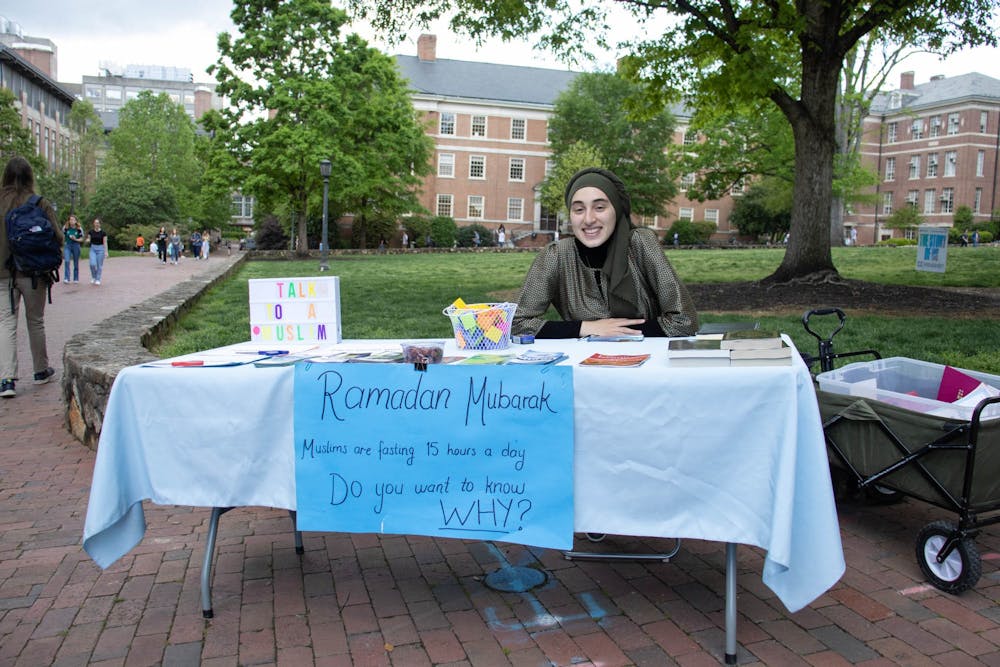The importance of having a place to pray isn’t just a matter of practicality, it’s a question of safety, Bayraktar said. She said that praying in the open can make Muslim students susceptible to Islamaphobic comments, given the physical aspect of Islamic prayer.
But sometimes, physical safe space isn’t readily accessible. When neuroscience major Husna Kider had a chemistry exam during a time she had to pray, she told her professor, who allowed her to step out of the room.
“All of the professors that I've talked to have been very willing to accommodate me,” she said, noting that this is especially true for prayer.
Religious accommodations
For more formal religious accommodations, students have the option to submit an official request form — something that Muslim students with exams landing on Eid al-Fitr can use to help them arrange their schedules to allow for them to practice their faith.
Eid al-Fitr falls in accordance with the sighting of the crescent moon and marks the end of Ramadan. Local mosques project that Eid will start the evening of Thursday, April 20.
Historically, the University has not held classes on all major Christian holidays.
“On any Christian major holiday like Christmas, Easter, there's no exams, there's no assignments due that day,” Sidra Qayyum, the most recent president of MSA said. “It's just a little frustrating when there's other religion’s holidays that aren't taken into account as well.”
In 2021, Kider’s chemistry final fell on Eid al-Fitr, so she emailed her professor and was able to take the exam on its designated makeup date.
Kider said she knows some students may be nervous about speaking with their professors or submitting a religious accommodation form, but encourages them to do so.
“The worst thing they could say is ‘no,’ which they won’t,” she said.
On several occasions, Kider's professors permitted accommodations for prayer without requiring an official request — something she achieved by communicating with professors over email in advance.
To get the day's news and headlines in your inbox each morning, sign up for our email newsletters.
Qayyum also said it would be helpful for the administration to be aware of when Islamic holidays fall so they can plan in advance to ensure exams and assignments are not scheduled on those days.
Kider said since a large number of Muslim students may have exams that fall near Eid, it could be easier for UNC's Accessibility Resources and Service not to hold exams during that time, given the number of requests they field.
Visibility on campus
Bayraktar said that, as a Muslim student who wears a hijab, a sense of belonging can be difficult to achieve among the masses at UNC.
“Having that sense of community and environment is really crucial for the Muslim students on campus,” Bayraktar said.
But visibility for Muslim students goes beyond prayer spaces, religious accommodations and inclusion in academic settings. Bayraktar said the MSA is trying to work with the Office of Diversity and Inclusion to increase awareness of the Muslim population on campus.
Bayraktar believes training sessions to dismantle Muslim stereotypes and combat Islamophobia would create change at large and allow for all voices and identities at UNC to be accounted for.
“It's not that people are ignorant or trying to not include,” she said. “But they are just not aware to bring in these voices into these spaces.”
In a statement to The Daily Tar Heel, the University said that the Office for Diversity and Inclusion has begun working on creating workshops that will “enhance knowledge and understanding related to inclusion and faith.”
The University also said that, over the years, staff at UNC Student Affairs has engaged regularly with the MSA leadership to advise on current needs and concerns, answer questions and discuss ways the University can better support the organization.
@laurennfich
university@dailytarheel.com




